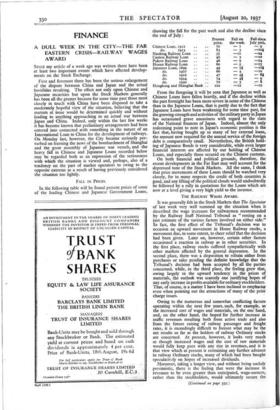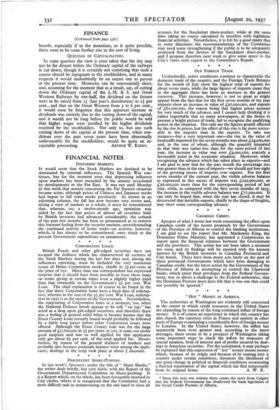FINANCE
A DULL WEEK IN THE CITY—THE FAR EASTERN CRISIS—RAILWAY WAGES AWARD
SINCE my article of a week ago was written there have been at least two important events which have affected develop- ments on the Stock Exchange.
First and foremost there has been the serious enlargement of the dispute between China and Japan and the actual hostilities resulting. The effect not only upon Chinese and Japanese securities but upon the Stock Markets generally has been all the greater because for some time past those most closely in touch with China have been disposed to take a moderately hopeful view of the situation, believing that the matters at issue would be determined quickly and without leading to anything approaching to an actual war between Japan and China. Indeed, only within the last few weeks it has become known that preliminary arrangements had been entered into connected with something in the nature of an International Loan to China for the development of railways. On Monday last, however, the City became seriously per- turbed on learning the news of the bombardment of Shanghai and the great assembly of Japanese war vessels, and the heavy fall in Chinese and Japanese Loans recorded below may be regarded both as an expression of the seriousness with which the situation is viewed and, perhaps, also of a tendency on the part of market operators to swing to the opposite extreme as a result of having previously considered the situation too lightly.
FALL IN PRICES.
In the following table will be found present prices of some of the leading Chinese and Japanese Government Loans, showing the fall for the past week and also the decline since the end of July :
Present price. Fall on the week. Fall sines July 3oth.
Chinese Loan, 1912 .. • • 70 — 1 — 9 do. 1913 ..
83 — 3 —Rik Nanking Railway Loan ..
• •
55 —to
—24
Canton Railway Loan
• • 40 — 3 —to Pukow Railway Loan
46 — 9
—24
Honan Railway Loan
.. 6o — 5
--15
Japanese Loan, 1899
49 — 5i —to} do. 1907 do. 1910
do. 1924
• • • • 66 74 — 4
— 44.
--to
— 9}
do. 193o ..
7o —3 —8 Hongkong and Shanghai Bank ..
102 --I0 —10
From the foregoing it will be seen that Japanese. as well as Chinese Loans have fallen heavily, and if the decline within the past fortnight has been more severe in some of the Chinese than in the Japanese Loans, that is partly due to the fact that Japanese Loans have been weakening for some time past, for the growing strength and activities of the military party in Japan has occasioned grave uneasiness with regard to the state of the National finances of Japan. Indeed, almost the only redeeming point to note in Japan's economic position is the fact that, having bought up so many of her external loans, the amount now required for the annual service of the foreign debt is comparatively small. Nevertheless, the British hold- ing of Japanese Bonds is very considerable, while even larger financial interests are affected by our holding of Chinese Loans, and especially those secured on the Chinese customs.
On both financial and political grounds, therefore, the recent developments in the Far East may well account for the depressed tone of the Stock Markets. All the same, I think that price movements of these Loans should be watched very closely, for in many respects the credit of both countries is good, and any lifting of the political clouds would undoubtedly be followed by a rally in quotations for the Loans which are now at a level giving a very high yield to the investor.
THE RAILWAY WAGES AWARD.
It was generally felt in the Stock Markets that The Spectator of last week very well summed up the situation when it described the wage increases for railwaymen recommended by the Railway Staff National Tribunal as " resting on a just estimate of the various factors involved on either side." In fact, the first effect of the Tribunal's decision was to occasion an upward movement in Home Railway stocks, a movement due, to some extent, to sheer relief that the decision had been given. Later on, however, certain other factors occasioned a reaction in railway as in other securities. In the first place, railway stocks suffered sympathetically with other markets affected by the general depression. In the second place, there was a disposition to refrain either from purchases or sales pending the definite knowledge that the Tribunal's decision had been accepted by all the parties concerned, while, in the third place, the feeling grew that, owing largely to the upward tendency in the prices of materials, the outlook was scarcely one justifying hopes of any early increase in profits available for ordinary stockholders. That, of course, is a matter I have been inclined to emphasise even when pointing out the attractions of many of the prior charge issues.
Owing to the numerous and somewhat conflicting factors operating within the next few years, such, for example, as the increased cost of wages and materials, on the one hand, and, on the other hand, the hoped for further increase in traffic revenues resulting both from active trade and also from the future raising of railway passenger and freight rates, it is exceedingly difficult to foresee what may be the net results so far as the holders of railway Ordinary stocks are concerned. At present, however, it looks very much as though increased wages and the cost of raw materials would fully keep pace with any rise in revenues, and it is that view which at present is restraining any further advance in railway Ordinary stocks, many of which had been bought speculatively on hopes of increased dividends.
Moreover, taking a longer view, and without being unduly pessimistic, there is the feeling that were the increase in revenues to be even greater than anticipated, wage-earners, rather than the stockholders, would ultimately secure the (Continued on page 332.)
FINANCE
(Continued from page 33o.)
benefit, especially if in the meantime, as is quite possible, there were to be some further rise in the cost of living.
QUESTION OF CAPITALISATION.
In some quarters the view is even taken that the day may not be far distant before the Ordinary capital of the railways is cut down, though it is certainly not surprising that such a course should be repugnant to the stockholders, and in many respects it would undoubtedly be an unjust one to pursue at the present time. Memories can be conveniently short, and, assuming for the moment that as a result, say, of cutting down the Ordinary capital of the L.M. & S. and Great Western Railways by one-half, the dividend on the former were to be raised from I4 (last year's distribution) to 21 per cent., and that on the Great Western from 3 to 6 per cent., it would soon be forgotten that this apparent increase in dividends was entirely due to the cutting down of the capital, and it would not be long before the public would be told that higher wages were justified by the higher dividends received by the stockholders. Not only so, but any such cutting down of the capital at the present time, when con- ditions over the past seven years have been abnormally unfavourable for the stockholders, would be quite an in-







































 Previous page
Previous page